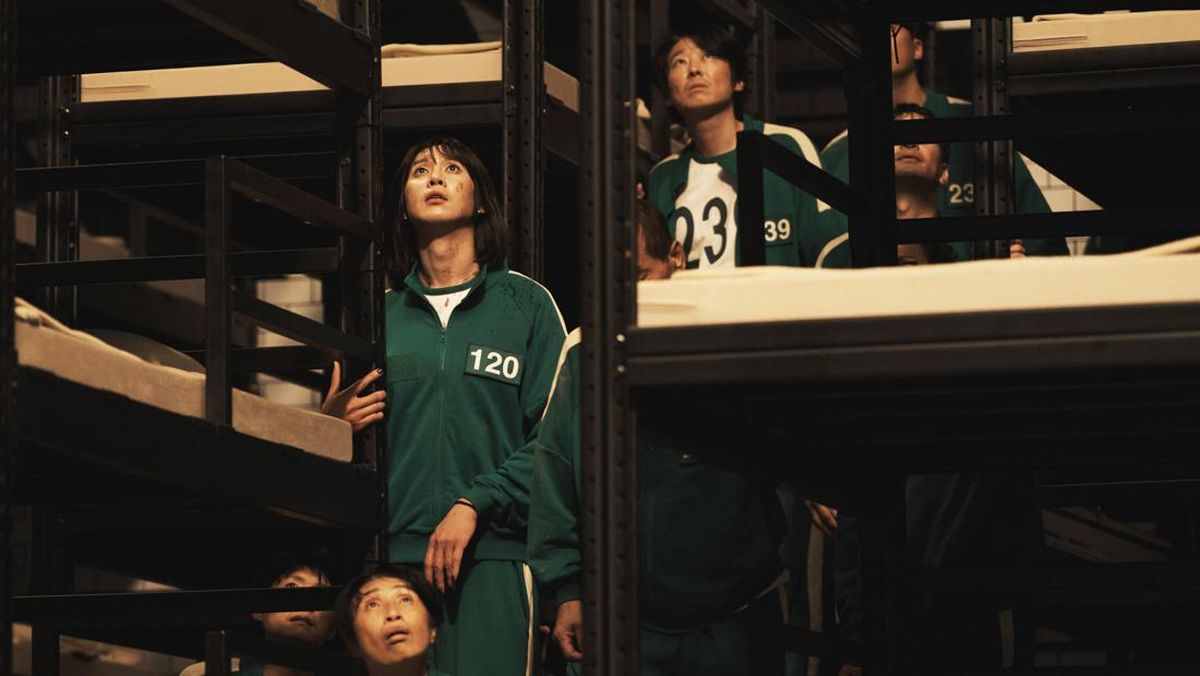Squid Game Histoire Vraie: Is the wildly popular Netflix series a reflection of harsh realities in South Korea, or purely fictional entertainment? This exploration dives into the socio-economic conditions that might have inspired the show’s brutal premise, examining the high debt levels, gambling culture, and economic disparities prevalent in South Korean society. We’ll compare the show’s desperate characters to real-life struggles, analyze the parallels between Squid Game’s deadly games and real-world survival shows, and discuss the show’s global impact and diverse interpretations.
We’ll look at the cultural significance of Squid Game within South Korea, exploring its reflection of Korean values and its influence on tourism and the entertainment industry. We’ll also analyze the games themselves, comparing them to real-world counterparts and examining their symbolic representation of societal pressures. Get ready to uncover the truth behind the games, and explore the fascinating intersection of fiction and reality.
The Socioeconomic Context of Squid Game
Squid Game’s shocking depiction of extreme debt and desperation resonated globally, but its portrayal isn’t entirely fictional. South Korea’s complex socioeconomic landscape, marked by significant income inequality and a pervasive culture of debt, provides a chillingly realistic backdrop for the show’s brutal games.
South Korean Debt and Economic Inequality
South Korea’s economic miracle has left a stark legacy of inequality. While the nation boasts a highly developed economy, a significant portion of the population struggles with crippling debt and precarious financial situations. High-pressure societal expectations contribute to this, pushing individuals to pursue risky financial ventures to maintain a certain lifestyle. The pressure to succeed academically and professionally, combined with the intense competition for jobs and housing, creates a breeding ground for financial stress.
Prevalence of Gambling and High-Interest Debt
Gambling and high-interest loans are alarmingly prevalent in South Korea. Desperate individuals often turn to these as quick fixes, only to find themselves trapped in a cycle of debt with increasingly devastating consequences. The easy accessibility of these options, coupled with limited social safety nets, exacerbates the problem. Many find themselves burdened by loans with exorbitant interest rates, making repayment nearly impossible.
Struggles of Low-Income Individuals and Families
Low-income individuals and families in South Korea face immense challenges. The cost of living, particularly in major cities like Seoul, is exceptionally high, leaving many struggling to afford basic necessities such as housing, food, and healthcare. The lack of affordable housing options forces many into cramped and substandard living conditions, adding further stress to their already precarious situations.
Limited access to quality education and job opportunities further perpetuates the cycle of poverty.
So you’re wondering about “Squid Game histoire vraie”? While the show’s fictional, the harsh realities of debt and desperation it portrays are sadly relatable. Think about the pressure these characters face – it’s a different kind of high-stakes game, much like the travel anxieties of a team like the Gonzaga Bulldogs, whose transportation, as you can see from this article on their gonzaga basketball plane , is also crucial to their success.
Ultimately, both scenarios highlight the pressures of competition and the consequences of failure.
Desperation in Squid Game vs. Real-Life South Korea

The desperation portrayed in Squid Game, where individuals willingly risk their lives for a chance at financial freedom, reflects the extreme measures some South Koreans might consider in the face of insurmountable debt. While the show’s depiction is heightened for dramatic effect, the underlying desperation and the willingness to take extreme risks to escape financial ruin resonate with the struggles faced by many in South Korea.
Fictional Game Scenarios vs. Real-Life Economic Pressures
| Squid Game Game | Real-Life Economic Pressure | Squid Game Game | Real-Life Economic Pressure |
|---|---|---|---|
| Red Light, Green Light | The constant pressure to keep up with societal expectations and avoid falling behind. | Tug-of-War | Competition for jobs and resources in a highly competitive society. |
| Honeycomb | Navigating complex bureaucratic processes and regulations. | Marbles | The exploitation of vulnerable individuals through predatory lending practices. |
| Glass Stepping Stones | The inherent risks and uncertainties of high-stakes financial decisions. | Squid Game | The ultimate struggle for survival in a system that prioritizes profit over human life. |
Survival Games and Reality TV: Inspiration and Parallels
The popularity of survival games and reality TV shows, which often involve high-stakes competition and intense psychological pressure, provides a framework for understanding the appeal and ethical implications of Squid Game’s premise.
Real-Life Survival Games and Reality TV Shows

- Shows like Survivor and Big Brother, while lacking the lethal consequences of Squid Game, share thematic elements such as isolation, competition, and the manipulation of social dynamics.
- Extreme survival challenges, often involving physical and mental endurance tests, can be seen as less extreme versions of the games in Squid Game.
Ethical Implications and Viewer Impact
The ethical implications of these shows, particularly concerning the level of psychological manipulation and the potential for long-term emotional distress among participants, are significant. The potential impact on viewers, especially vulnerable individuals, is also a cause for concern. The normalization of extreme competition and the blurring of lines between entertainment and exploitation are crucial aspects to consider.
Risk and Consent in Reality Shows vs. Squid Game
While reality shows typically involve informed consent, the level of risk and the potential for psychological harm are often debated. Squid Game, in contrast, depicts a scenario where consent is coerced under extreme duress, highlighting the stark difference in ethical frameworks.
Psychological Effects of High-Stakes Competitions
Participating in high-stakes competitions can have profound psychological effects, ranging from increased stress and anxiety to feelings of isolation and betrayal. The pressure to perform and the potential for significant loss can lead to long-term emotional and mental health consequences.
Similarities and Differences between Squid Game and Real-Life Competition Shows
- Similarities: Intense competition, strategic alliances, social manipulation, psychological pressure, elimination process.
- Differences: Lethal consequences (Squid Game), informed consent (Reality Shows), level of physical and psychological risk, potential for long-term harm.
Squid Game’s Cultural Significance in South Korea
Squid Game’s massive success in South Korea wasn’t just a matter of entertainment; it sparked significant cultural conversations and had a tangible impact on various aspects of Korean society.
Public Reaction to Squid Game in South Korea
The public reaction to Squid Game in South Korea was overwhelmingly positive, with the show becoming a cultural phenomenon. It sparked discussions about social inequality, the pressures of modern life, and the dark side of the pursuit of success. The show’s popularity also led to a surge in interest in the traditional Korean children’s games featured in the series.
Reflection and Challenge of Korean Cultural Norms
Squid Game reflects certain aspects of Korean culture, such as the emphasis on competition, the importance of education, and the pressure to conform to societal expectations. However, it also challenges these norms by highlighting the negative consequences of such a highly competitive and individualistic society. The show’s dark humor and unflinching portrayal of violence also pushed boundaries within Korean media.
Impact on Tourism and the Korean Entertainment Industry

Squid Game had a significant impact on tourism in South Korea, with many locations featured in the show becoming popular tourist destinations. The show’s global success also boosted the Korean entertainment industry’s international profile, further solidifying its position as a major player in the global media landscape. This led to increased investment and production of similar content.
Representation of Korean History and Social Issues
Squid Game subtly incorporates elements of Korean history and social issues, such as the economic disparities between generations and the struggles of marginalized communities. The show uses the backdrop of familiar games to explore deeper societal issues and the lingering impact of the past.
Visual Representation of Squid Game’s Cultural Impact
Imagine a stylized graphic: a dalgona candy (honeycomb) melting into a cityscape representing Seoul, with silhouettes of players from the show superimposed. This would symbolize the blend of traditional Korean culture and the harsh realities of modern South Korean life as depicted in Squid Game. The graphic could incorporate elements of both the vibrant and the dark aspects of the show’s impact.
Global Reception and Interpretations of Squid Game
Squid Game’s global popularity transcended language and cultural barriers, leading to diverse interpretations and discussions across the world.
So, you’re curious about the “Squid Game histoire vraie” – whether the show’s brutal games are based on real-life events? While the specifics are fictional, the show reflects anxieties about economic inequality. Think about the scale of that desperation – it’s almost like the breathtaking visuals of a massive spectacle, like the shanghai drone show 2027 , but instead of light, it’s a desperate struggle for survival.
Ultimately, “Squid Game histoire vraie” explores themes that resonate far beyond the screen.
International Popularity and Critical Reception
Squid Game achieved unprecedented global success, becoming one of the most-watched Netflix shows ever. Critical reception was largely positive, praising the show’s compelling narrative, strong performances, and social commentary. However, some criticisms focused on the show’s graphic violence and its potential to glorify violence.
So, you’re digging into the “Squid Game histoire vraie” debate? It’s fascinating how real-life struggles inspire such intense fiction. Think about the sheer scale and coordination needed – it’s almost like a massive, coordinated drone show, like the amazing chinese dragon drone show I saw online. The precision and spectacle are similar, highlighting the power of both human ingenuity and creative storytelling, all relating back to the core themes of “Squid Game histoire vraie”.
Cross-Cultural Interpretations
The show’s themes of economic inequality, social injustice, and the human cost of ambition resonated with audiences worldwide, although the specific cultural contexts and interpretations varied. In some cultures, the emphasis was on the brutal nature of capitalism, while in others, the focus was on the psychological aspects of survival and human resilience.
Global Resonance of Squid Game’s Themes
The show’s success lies in its ability to tap into universal anxieties about economic insecurity and social mobility. The themes of desperation, competition, and the struggle for survival are relatable across cultures and socioeconomic backgrounds, regardless of geographical location.
Interpretations of Symbolism and Allegory
The symbolism and allegory in Squid Game have been widely discussed and interpreted. The games themselves have been seen as metaphors for societal pressures and the dehumanizing aspects of capitalism. The characters’ individual struggles represent the broader societal issues faced by many across the globe.
Diverse Global Reactions to Squid Game
The global response to Squid Game showcases the power of storytelling to transcend cultural boundaries and spark critical conversations about shared human experiences. Its success highlights the universality of themes such as economic inequality and the human cost of ambition, while also prompting discussions about the ethical implications of entertainment that portrays extreme violence.
The Games Themselves: Real-World Counterparts and Inspirations
The games in Squid Game, while amplified for dramatic effect, draw inspiration from real-world games and activities, often reflecting the simplicity and brutality of childhood games contrasted with the high stakes of adult life.
Real-World Games Resembling Squid Game Games
- Red Light, Green Light: A classic children’s game with a simple premise but high consequences in the show’s context.
- Dalgona Candy (Honeycomb): A traditional Korean street food game, adapted to test precision and patience under pressure.
- Tug-of-War: A common team game, highlighting cooperation and competition.
- Marbles: A simple childhood game elevated to a high-stakes test of trust and manipulation.
- Glass Stepping Stones: A game of chance and risk, mirroring the unpredictability of life.
- Squid Game: A traditional Korean children’s game, symbolically representing the struggle for survival in a brutal system.
Historical Context and Origins of the Games, Squid game histoire vraie
Many of the games have deep roots in Korean culture, representing childhood memories and traditions. Their simplicity contrasts sharply with the life-or-death stakes imposed in the show, highlighting the contrast between innocent childhood games and the brutal realities of adult life.
Simplicity and Brutal Nature of the Games
The simplicity of the games belies their brutal nature. The rules are straightforward, but the consequences are extreme, emphasizing the vulnerability of the players and the ruthlessness of the system.
Comparison to Real-World Competitive Activities
The games can be compared to various real-world competitive activities, ranging from corporate competitions to athletic events. The emphasis on winning at all costs, often at the expense of others, is a recurring theme.
Games as Symbols of Societal Pressures
The games in Squid Game serve as potent symbols of the societal pressures and inequalities that drive the characters to participate. Each game represents a different aspect of the struggle for survival in a system that prioritizes profit and competition above human life.
End of Discussion: Squid Game Histoire Vraie
Ultimately, while Squid Game is a work of fiction, its powerful portrayal of desperation and societal inequalities resonates deeply with global audiences. The show serves as a chilling reminder of the very real struggles faced by many, prompting discussions about economic disparity, the ethics of entertainment, and the human cost of competition. By exploring the show’s inspiration and cultural impact, we gain a deeper understanding of both the fictional world of Squid Game and the complex realities it reflects.
Essential Questionnaire
Was Squid Game based on a true story?
No, Squid Game is not based on a single true story. However, it draws inspiration from real-world issues like economic inequality and the prevalence of high-stakes competition in South Korean society.
Are the games in Squid Game based on real games?
Some of the games in Squid Game, like “Red Light, Green Light,” are based on childhood games played in Korea. However, the deadly consequences are entirely fictional.
How did Squid Game impact South Korean tourism?
Squid Game’s popularity led to a surge in tourism to South Korea, with fans visiting filming locations and experiencing the culture depicted in the show.
What is the main message of Squid Game?
Squid Game explores themes of economic inequality, desperation, and the dark side of human nature under pressure. It highlights the consequences of unchecked capitalism and societal flaws.
